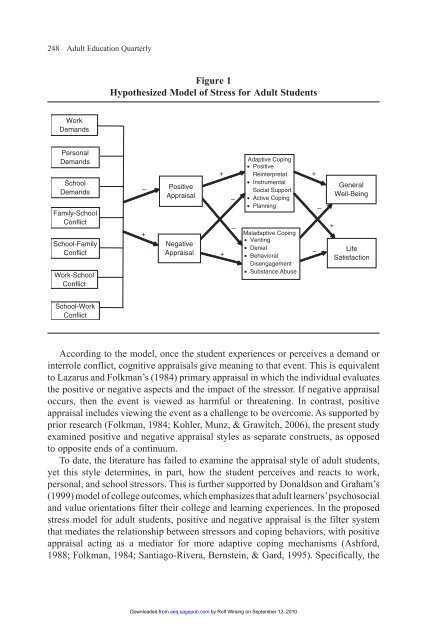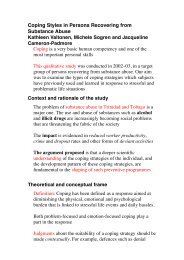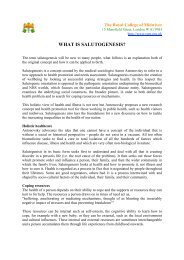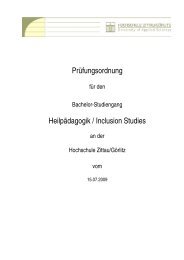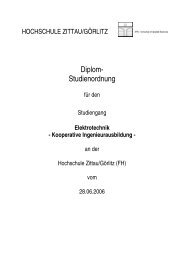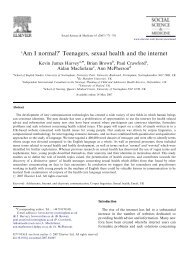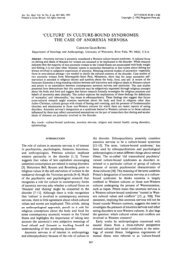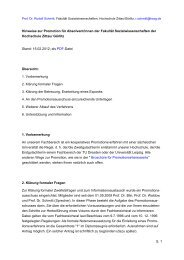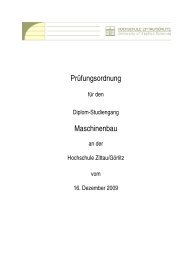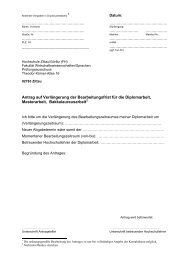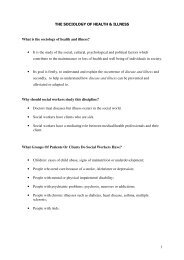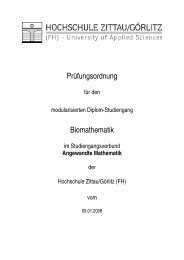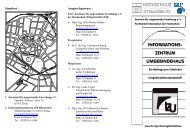Dealing With the Stress of College
Dealing With the Stress of College
Dealing With the Stress of College
You also want an ePaper? Increase the reach of your titles
YUMPU automatically turns print PDFs into web optimized ePapers that Google loves.
248 Adult Education Quarterly<br />
Work<br />
Demands<br />
Personal<br />
Demands<br />
School<br />
Demands<br />
Family-School<br />
Conflict<br />
School-Family<br />
Conflict<br />
Work-School<br />
Conflict<br />
School-Work<br />
Conflict<br />
Figure 1<br />
Hypo<strong>the</strong>sized Model <strong>of</strong> <strong>Stress</strong> for Adult Students<br />
–<br />
+<br />
Positive<br />
Appraisal<br />
Negative<br />
Appraisal<br />
According to <strong>the</strong> model, once <strong>the</strong> student experiences or perceives a demand or<br />
interrole conflict, cognitive appraisals give meaning to that event. This is equivalent<br />
to Lazarus and Folkman’s (1984) primary appraisal in which <strong>the</strong> individual evaluates<br />
<strong>the</strong> positive or negative aspects and <strong>the</strong> impact <strong>of</strong> <strong>the</strong> stressor. If negative appraisal<br />
occurs, <strong>the</strong>n <strong>the</strong> event is viewed as harmful or threatening. In contrast, positive<br />
appraisal includes viewing <strong>the</strong> event as a challenge to be overcome. As supported by<br />
prior research (Folkman, 1984; Kohler, Munz, & Grawitch, 2006), <strong>the</strong> present study<br />
examined positive and negative appraisal styles as separate constructs, as opposed<br />
to opposite ends <strong>of</strong> a continuum.<br />
To date, <strong>the</strong> literature has failed to examine <strong>the</strong> appraisal style <strong>of</strong> adult students,<br />
yet this style determines, in part, how <strong>the</strong> student perceives and reacts to work,<br />
personal, and school stressors. This is fur<strong>the</strong>r supported by Donaldson and Graham’s<br />
(1999) model <strong>of</strong> college outcomes, which emphasizes that adult learners’ psychosocial<br />
and value orientations filter <strong>the</strong>ir college and learning experiences. In <strong>the</strong> proposed<br />
stress model for adult students, positive and negative appraisal is <strong>the</strong> filter system<br />
that mediates <strong>the</strong> relationship between stressors and coping behaviors, with positive<br />
appraisal acting as a mediator for more adaptive coping mechanisms (Ashford,<br />
1988; Folkman, 1984; Santiago-Rivera, Bernstein, & Gard, 1995). Specifically, <strong>the</strong><br />
+<br />
+<br />
–<br />
–<br />
Adaptive Coping<br />
• Positive<br />
Reinterpretat.<br />
• Instrumental<br />
Social Support<br />
• Active Coping<br />
• Planning<br />
Maladaptive Coping<br />
• Venting<br />
• Denial<br />
• Behavioral<br />
Disengagement<br />
• Substance Abuse<br />
Downloaded from<br />
aeq.sagepub.com by Rolf Wirsing on September 12, 2010<br />
+<br />
–<br />
–<br />
+<br />
General<br />
Well-Being<br />
Life<br />
Satisfaction


